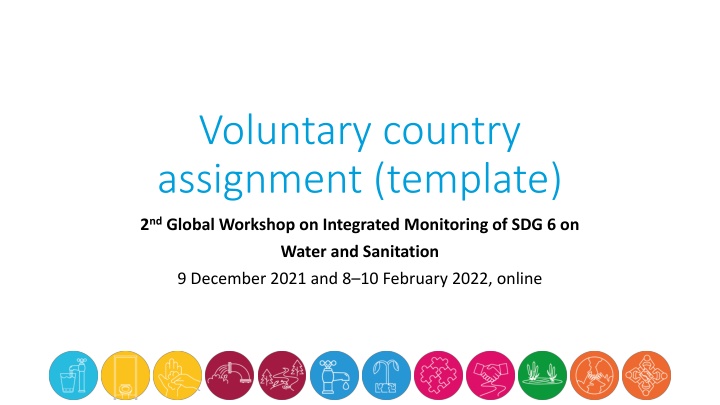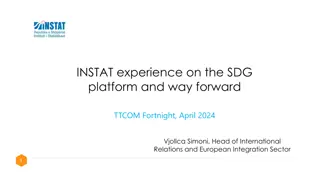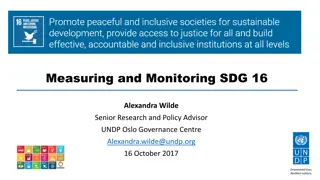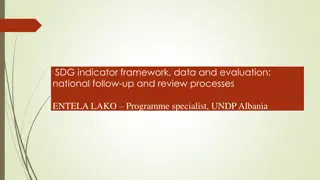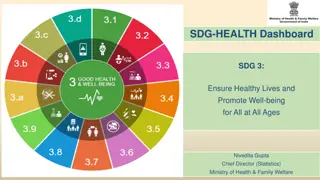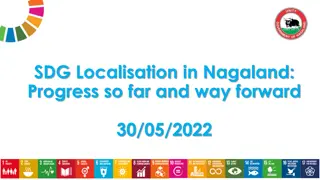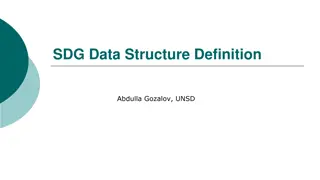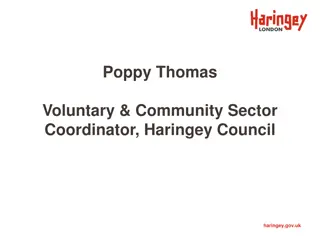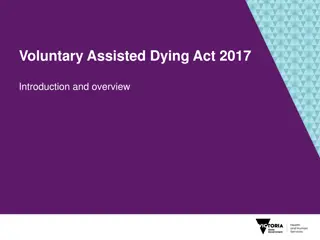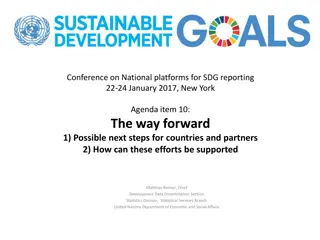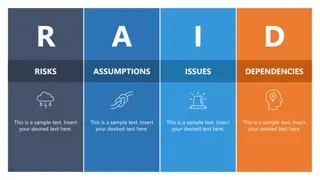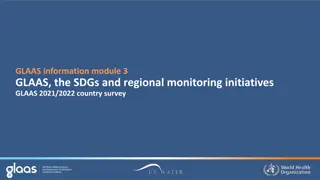Voluntary Country Assignment Template for SDG 6 Workshop
Encouraging countries to undertake a voluntary assignment focusing on SDG 6 monitoring to facilitate cross-sectoral dialogue and informed discussions. The assignment involves gathering information on past monitoring efforts, data communication, policy usage, and future needs from various focal points. Completed assignments are to be submitted by January 31, 2022, shaping discussions at the workshop and guiding the UN-Water Integrated Monitoring Initiative for SDG 6.
Download Presentation

Please find below an Image/Link to download the presentation.
The content on the website is provided AS IS for your information and personal use only. It may not be sold, licensed, or shared on other websites without obtaining consent from the author.If you encounter any issues during the download, it is possible that the publisher has removed the file from their server.
You are allowed to download the files provided on this website for personal or commercial use, subject to the condition that they are used lawfully. All files are the property of their respective owners.
The content on the website is provided AS IS for your information and personal use only. It may not be sold, licensed, or shared on other websites without obtaining consent from the author.
E N D
Presentation Transcript
Voluntary country assignment (template) 2ndGlobal Workshop on Integrated Monitoring of SDG 6 on Water and Sanitation 9 December 2021 and 8 10 February 2022, online
About the assignment This assignment is voluntary, but we would encourage your country to undertake it as it will help to create a cross-sectoral dialogue in your country and will help enable more informed discussions in the February workshop. The assignment consists of questions on three topics, directly linked to the topics that will be discussed in the workshop. Specifically, we would like to know more about how your country has worked with SDG 6 monitoring during the last few years (across all SDG 6 indicators), how the data are communicated and used in national policy processes, and what your needs and priorities are for future work. To complete the assignment, you are encouraged to convene a meeting with as many of the SDG 6 monitoring focal points within your country as possible. These includes the overall focal point for SDG 6 monitoring, all the indicator-specific focal points (across ministries), as well as contacts in the national statistical office with overall responsibility for SDG reporting. If you do not already know the other focal points in your country, please write to monitoring@unwater.org and we will help you get in touch with them. You can see all data submitted by your country on https://sdg6data.org/. The assignment will be introduced in the kick-off session on 9 December 2021, in which you can ask any questions you may have. You can also ask questions by email to monitoring@unwater.org. Please use the following template to capture your country s joint experience (you can add as many slides as you need). On each page, you find a yellow box with instructions to guide your discussions. Countries are requested to complete and submit the assignment to monitoring@unwater.org by 31 January 2022. The submitted content will help shape the discussions in the workshop, as well as the planning of the next phase of the UN- Water Integrated Monitoring Initiative for SDG 6. As appropriate, the content will also be shared on https://www.sdg6monitoring.org/, to inspire other countries in their work (please let us know if you do not want us to publish your assignment).
Proposed process for completing the assignment Get in touch with other SDG 6 focal points in your country to schedule a meeting (virtual or face-to-face if the situation allows for it). Each focal point prepares for the meeting by looking at the questions from her/his perspective, and consults with other colleagues as necessary. During the meeting, all focal points participate and questions are discussed in as a group, to capture both indicator-specific and cross-cutting experiences. One focal point acts as rapporteur (potentially the overall focal point) and summarizes the discussion and completes the assignment based on the provided template (this PPT document). The completed assignment is reviewed by all focal points and then submitted to monitoring@unwater.org by 31 January 2022. All focal points participate in the workshop to share the country s experience with other participating countries.
SDG 6 focal points in the country Instructions Please list all the focal points who have participated in the assignment exercise (name, organization, and indicator focus).
Experience to date on SDG 6 monitoring and reporting Instructions Please reflect on the work on SDG 6 monitoring within your country during the last few years (2018-2021). Please summarize the discussion here (you can add more slides if necessary). Possible questions to consider: How did you organize the data collection and which institutions/organisations were involved (e.g. national statistical office, line ministries, local governments, regional organisations, academia, private sector, NGOs etc.)? Did you discuss the work with other (SDG 6) focal points in your country? Were you able to report the requested data (if not, why)? What are the main data gaps? What did you think about the reporting process? What has been the value of the process at the national level? What support did you receive from the UN custodian agency (e.g. methodology, helpdesk, bilateral calls, webinars)? What were the main challenges and opportunities encountered? Which are the main lessons learned? How could you improve the institutional collaboration across indicators and sectors?
Use of data to inform policy Instructions High-quality data enable evidence-based policy- and decision-making, ensure accountability and transparency, and attract political commitments and public and private investments. Please reflect on how the collected data/resulting analysis are used for policy- making and other purposes at various levels within your country. Please summarize the discussion here (you can add more slides if necessary). Possible questions to consider: Which are the main uses of the data (e.g. raise awareness, advocate action and funding) at what local, national and international levels (e.g. development partners, financial institutions)? Which policy processes are benefitting the most from the data? What types of analyses are you doing with the data, and are you combining the data with data from other sectors? Who are you sharing the data with (which institutions/sectors, at what level of seniority)? Was the reporting process helpful in terms of subsequent data sharing and use? How do you share the results (e.g. technical reports, summary reports, website, social media, newspapers, meetings etc.)? Which are the main challenges and opportunities for using data to inform policy decisions? How could you improve the uptake of data across audiences/sectors?
Needs and priorities for the future Instructions Based on your discussions on past monitoring experience and data use, what are the main needs and priorities for future water and sanitation monitoring in your country? Please summarize the discussion here (you can add more slides if necessary). Possible questions to consider What are you currently doing to address existing data gaps? Which are the main areas that you would like to see improve for future monitoring, reporting and utilization of SDG 6 data in your country? You may wish to consider different accelerators such as governance, capacity development, finance and innovation. Which needs are indicator-specific and which are cross-cutting? At what level and within which sectors could/should the different needs be addressed? What could be done by whom in the short/medium/long term to meet these needs? How do you prioritize the different needs?
Examples and ideas for communicating data (optional) Instructions To ensure that stakeholders are able to use the data/analysis, these need to be presented to them in an understandable and actionable way. Technical experts may ask for a lot of detail to interpret the findings, whereas high-level policy makers are interested in the overall trends, impacts and next steps. And the general public may want to know about the current situation and what can be done to improve it, in simple and clear words and illustrations. As we will learn from our communication expert during the December kick-off session, the selection and presentation of data need to be tailored to the audience. Please share with us examples of how you are communicating your data/analysis with different types of audiences (e.g. with screen shots or links). If you want, you can also share your ideas on this, e.g. sketches and prototypes. A selection of these examples/ideas will be presented by the communications expert during the global workshop.
